By Ana Rodriguez Soto - The Archdiocese of Miami
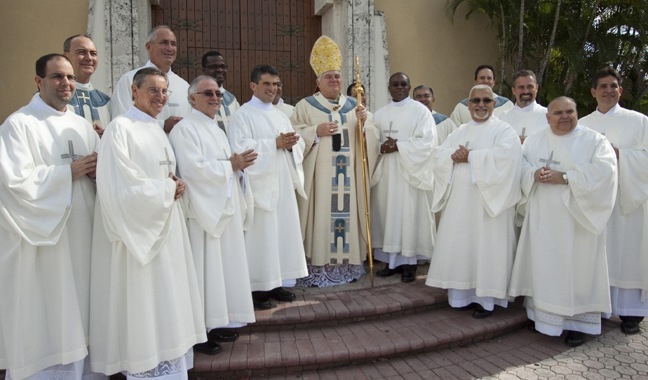
Photographer: ANA RODRIGUEZ-SOTO | FC
Newly-ordained deacons pose with Archbishop Thomas Wenski and others involved in their preparation for an official photograph at the end of the Mass.
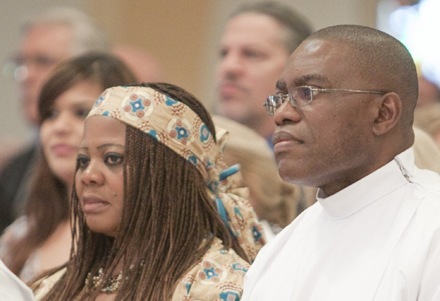
Photographer: ANA RODRIGUEZ-SOTO | FC
Soon-to-be-ordained Deacon Valentine Onuigbo and his wife, Philomina, take part in the start of Mass.
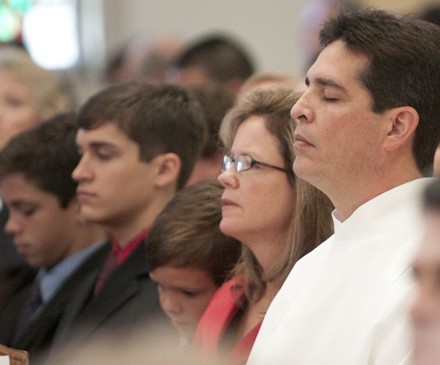
Photographer: ANA RODRIGUEZ-SOTO | FC
Jose Villena, his wife Linda, and their children, take part in the Mass.
�Before we got married, he told me that one day, he had that in his heart as a possibility,� said Charur. �I told him I was fine with it.�
Seventeen years and two daughters later, Carlos Charur, 41, a native of El Salvador and member of Epiphany Parish who manages the finances for his family�s steel business, was ordained a permanent deacon for the Archdiocese of Miami.
He was one of 10 men � many of them with young families � whose ordination Dec. 17 provided an early Christmas present to the Church in South Florida.
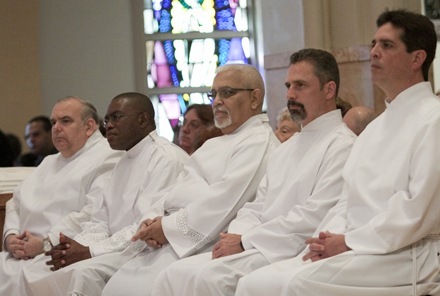
Photographer: ANA RODRIGUEZ-SOTO | FC
Before their ordination, the men listen to Archbishop Thomas Wenski's homily. From left: Gregory McLaughlin, Valentine Onuigbo, Antonio Perez-Noy, Timothy Smith and Jose Villena.
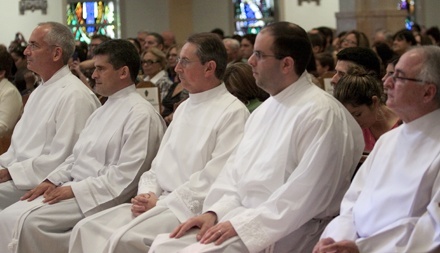
Photographer: ANA RODRIGUEZ-SOTO | FC
Before their ordination, the men listen to Archbishop Thomas Wenski's homily. From left: George Labelle, Guillermo Dutra, Ernesto del Riego, Carlos Charur and Jose Aleman.
Their ordination brings to 151 the number of permanent deacons who are incardinated in the archdiocese � another 10 are incardinated in other dioceses but ministering in South Florida, said Deacon Victor Pimentel, director of the Office for the Permanent Diaconate in the archdiocese.
�It�s a joy. It�s very humbling to see these men walk from inquiry � when they first feel called and want to know what diaconate is all about � to ordination,� said Deacon Pimentel. �They think it�s a matter of a week or two. I tell them it�s four years."
Actually five, including aspirancy and a pastoral year. Those five years include night and weekend studies in philosophy and theology at the seminary, and a process that takes them through several steps: from inquiry to aspirancy to candidacy, with installation in the offices of lector and acolyte along the way.
�I see a transformation taking place in them as they move� from one stage to the next, said Deacon Pimentel, noting that, by the end of the four years, the number of men who remain in the program is always reduced. In the case of the class of 2011, 20 started out, but only half that many were ordained.
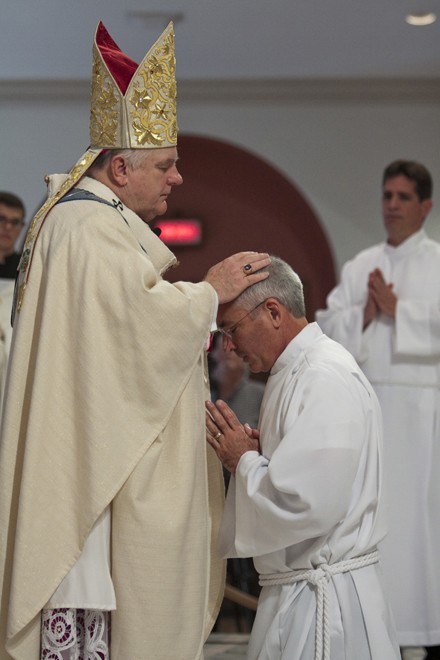
Photographer: ANA RODRIGUEZ-SOTO | FC
Archbishop Thomas Wenski lays hands on George Labelle, calling down the Holy Spirit and ordaining him a permanent deacon.
Deacon Onuigbo is a civil engineer, and reading theology instead of solving mathematical equations proved a bit daunting. He gives credit to two Nigerian priests who are in residence at his parish, Holy Family in North Miami, for helping him: Father Daniel Asue and Father Clement Iorliam.
�They actually helped me understand everything. Without their help it would have been a little more difficult,� said Deacon Onuigbo, who will help out in his parish and serve in prison ministry while continuing to work fulltime as a civil engineer.
Deacon Onuigbo said he never thought about the priesthood or diaconate until Father Mark Reeves, who is now retired but served some years ago at Holy Family, suggested it.
�He said, �Why don�t you just try it?�� recalled Deacon Onuigbo, who came to the U.S. about 30 years ago to study and is a graduate of Miami Dade College and Florida International University.
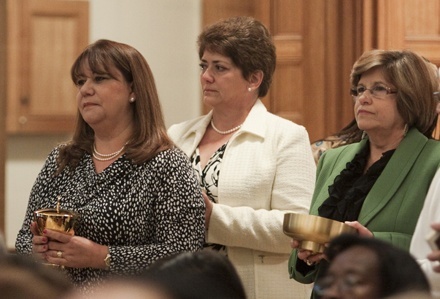
Photographer: ANA RODRIGUEZ-SOTO | FC
Deacons' wives take up the offertory, from left: Mercedes Perez-Noy, Heidi McLaughlin and Mayte Aleman.
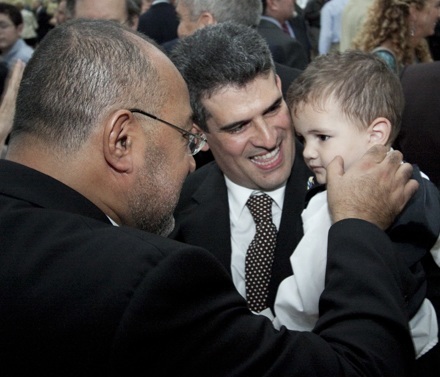
Photographer: ANA RODRIGUEZ-SOTO | FC
Deacon Victor Pimentel, left, director of the Office of the Permanent Diaconate, congratulates newly-ordained Deacon Guillermo Dutra who is holding his son, Lucas, 14 months old.
Perhaps his son, now 10, will fulfill that wish. But for now, Deacon Onuigbo said, his diaconate represents �a dying to yourself. Looking at everything God has done for me here. This is just saying �thank you� to God.�
Deacon Guillermo Dutra, 42, whose youngest son is 14 months old, said he first felt the call during an Emmaus retreat, when he was giving a talk about the sacraments.
A native of Uruguay and member of Good Shepherd Parish in Miami, Deacon Dutra is an accountant who manages his own firm. He said he tried fighting with God but �God calls and when he calls he grabs you and doesn�t let go.�
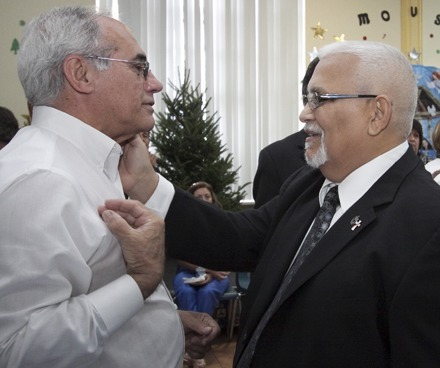
Photographer: ANA RODRIGUEZ-SOTO | FC
Newly-ordained Deacon Antonio Perez-Noy, right, imparts a blessing to a friend at the reception which followed the ceremony.
�My vocation dates from a long time ago, but I never had the courage to say �yes� until now,� said Deacon Antonio Perez-Noy, 61, a psychiatrist from St. Raymond Parish in Miami and one of only two grandfathers in this year�s class of permanent deacons.
The fact that the class of 2011 includes a high proportion of �young fathers, young husbands,� is a fairly recent trend, said Deacon Pimentel. Early on, most of those ordained to the permanent diaconate tended to be of retirement age, or at the very least had children who had graduated from college.
�It was something practical in nature� but not part of the requirement, Deacon Pimentel explained. The fact is that �in the permanent deaconate most of us are married and we witness to the sanctity of marriage.�
Permanent deacons, by virtue of their ordination, are part of the clergy. Like priests, they can baptize, officiate at weddings and funerals, proclaim the Gospel and preach at Mass. They cannot, however, celebrate the Mass, hear confessions or consecrate the bread and wine.
The diaconate is �a ministry of service,� Deacon Pimentel said. Although all the baptized are called to service, the diaconate entails �a higher level of service with a higher responsibility.�
�Your diakonia or service is threefold: service of the Word, service of the Eucharist and service of the poor,� Archbishop Wenski told the permanent deacons just before he ordained them. �But it is because the deacon serves at the table of the poor that he has his distinctive liturgical roles at the table of the Lord. Yes, deacons assist at the altar; but they are called primarily to that other �service of the table� referred to in the Acts of the Apostles: the care of the orphans and widows. As co-workers with the bishop and priests, you must be the living and working expression of the charity of the Church. � Thus you have a special responsibility to identify to the Church those who are in need and particularly those who are without the power of voice at the margins of our society.�


Comments from readers
Believe what you read. Teach whay you believe. Practice what you teach. (from the Rite of Ordination to the Diaconate).
May God Bless you always...